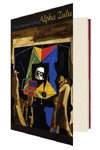“Lester Yates, your blow-up doll / should have stayed in port.” So begins “The Deep Dive Epistle of Watch Section 3,” the funniest and strangest of Gary Copeland Lilley’s poems about his years in the Navy, where he served on a nuclear submarine. Such depths alone won’t make a poet profound, but Lilley does bring to this second book, if not deep wisdom, then serious experience, acquired before and during his uniformed service: the author began (if the poems do hold autobiography) in rural poverty in North Carolina, and spent years (or else he sounds as if he did) in some of the roughest neighborhoods of Washington, D.C. The poems tell stories from difficult places, not so much about the hard luck the characters face as about how and when they face it: “Raven who is also Raymond,” a transsexual from the projects defends herself; “sailors cross the state line, from Portsmouth to Kittery on foot in the freeze, snow knee deep,” to see “Ta Ta’s Triple-X Friday night feature.”
Without such stories there would be no poems, but no good poem is only a story, and Lilley’s power comes partly from his sound: syncopated, densely compacted, defiantly resigned. His happiest poems are defiant displays of hope: an elderly pair of Katrina evacuees see a bouquet in “A peep of red flowers in the woodchips / and weeds by the door of their motel room.” Other scenes point to harsher ironies, as in lines about a storefront church: “Today is worship // and security bars are pulled back.” Ten sonnets take titles from tarot cards (King of Swords, Justice, the Hanged Man), situations from the District, and language, voraciously, from discordant registers—sometimes Latinate, quiet, reflective; sometimes percussive, aggressive, hip-hop: “Don’t believe all those wet-finger stories / caught in the fine hairs of your ear hole. / Even in the part-truths there are salvations… I’m the king of tension, the sharpened knife… but my hand is not on a Glock / looking for no fool, got no cocked hot trigger / waiting on my pull.”
Lilley’s characters act angry or delighted, compulsive, devoted, or satisfied, but when he depicts himself he sounds sad. The title means “A to Z” in the military alphabet; the title poem is “My self-portrait: gray locks in the beard, red eyes // burning back in the mirror, the truths of grooves / and nicks on my...
You have reached your article limit
Sign up for a digital subscription and continue reading all new issues, plus our entire archives, for just $1.50/month.
Already a subscriber? Sign in





